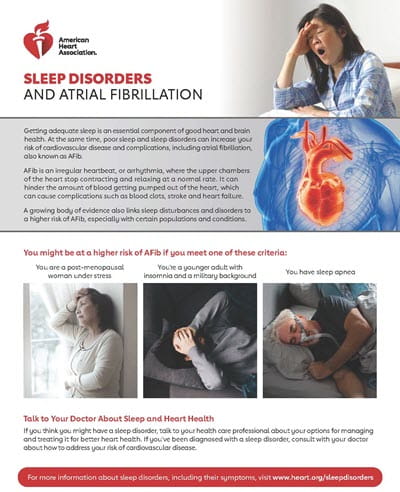Sleep Disorders and Atrial Fibrillation
Getting adequate sleep is an essential component of good heart and brain health. At the same time, poor sleep and sleep disorders can increase your risk of cardiovascular disease and complications, including atrial fibrillation, also known as AFib or AF.
Atrial fibrillation is an irregular heartbeat, or arrhythmia, where the upper chambers of the heart stop contracting and relaxing at a normal rate. It can hinder the amount of blood getting pumped out of the heart, which can cause complications such as blood clots, stroke and heart failure. It’s most common in adults over 60 and is projected to affect more than 12 million people by 2030.
The traditional risk factors for AFib include older age, high blood pressure, diabetes and obesity, but a growing body of evidence also links sleep disturbances and disorders to a higher risk of AFib, especially with certain populations and conditions.
Sleep Disorders and AFib Fact Sheet (PDF)
Post-Menopausal Women, Stress, Insomnia and AFib
The combination of insomnia and stress can lead some post-menopausal women to develop an irregular heart rhythm after menopause, according to a recent study.
Researchers found that 1 in 4 women between the ages of 50-79 developed AFib, and there was a correlation between sleep disturbances and stress in affected women. The study suggests the heart is susceptible to the hormonal changes connected to stress and poor sleep, which can lead to AFib.
Insomnia and AFib in Young Veterans
Insomnia can be an early risk factor for AFib in younger adults, especially those with a military background.
In a recent study, researchers found that young veterans with insomnia were 32% more likely to develop AFib than those without insomnia. An analysis of more than 1 million medical records showed that veterans with insomnia developed AFib more than two years earlier than their peers without sleep issues.
Researchers caution against applying these findings to a broader population of young adults since military veterans can have other risk factors that cause sleep disturbances, including traumatic brain injury, post-traumatic stress disorder, anxiety and depression and chronic pain. But they say it highlights a need to examine the connection between sleep disturbances and cardiovascular health in young adults.
Sleep Apnea and AFib
Sleep-disordered breathing, including sleep apnea, can be connected to cardiac arrhythmias like AFib. Sleep apnea causes disruptions to your breathing during sleep, which makes it hard for your body to get the oxygen it needs. Treating sleep apnea and other sleep-disordered breathing can be an effective way to address AFib and improve health outcomes.
Talk to Your Doctor About Sleep and Heart Health
If you think you might have a sleep disorder, talk to your health care professional about your options for managing and treating it for better heart health. If you’ve been diagnosed with a sleep disorder, consult with your doctor about how to address your risk of cardiovascular disease.






